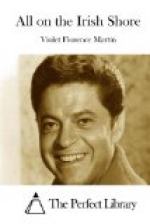I distinctly liked the looks of my mount when Jerry the Whip pulled her out of the stable for me. She was big and brown, with hindquarters that looked like jumping; she was also very dirty and obviously underfed. None the less she was lively enough, and justified Jerry’s prediction that “she’d be apt to shake a couple or three bucks out of herself when she’d see the hounds”. Old Robert was on an ugly brute of a yellow horse, rather like a big mule, who began the day by bucking out of the yard gate as if he had been trained by Buffalo Bill. It was at this juncture that I first really respected Robert Trinder; his retention of his seat was so unstudied, and his command of appropriate epithets so complete.
Jerry and the hounds awaited us on the road, the latter as mixed a party as I have ever come across. There were about fourteen couple in all, and they ranged in style from a short-legged black-and-tan harrier, who had undoubtedly had an uncle who was a dachshund, to a thing with a head like a greyhound, a snow-white body, and a feathered stern that would have been a credit to a setter. In between these extremes came several broken-haired Welshmen, some dilapidated 24-inch foxhounds, and a lot of pale-coloured hounds, whose general effect was that of the tablecloth on which we had eaten our breakfast that morning, being dirty white, covered with stains that looked like either tea or egg, or both.
“Them’s the old Irish breed,” said Robert, as the yellow horse voluntarily stopped short to avoid stepping on one of them; “there’s no better. That Gaylass there would take a line up Patrick Street on a fair day, and you’d live and die seeing her kill rats.”
I am bound to say I thought it more likely that I should live to see her and some of her relations killing sheep, judging by their manners along the road; but we got to Letter cross-roads at last with no more than an old hen and a wandering cur dog on our collective consciences. The road and its adjacent fences were thronged with foot people, mostly strapping young men and boys, in the white flannel coats and slouched felt hats that strike a stranger with their unusualness and picturesqueness.
“Do you ever have a row with Land Leaguers?” I asked, noting their sticks, while the warnings of a sentimental Radical friend as to the danger of encountering an infuriated Irish peasantry suddenly assumed plausibility.
“Land League? The dear help ye! Who’d be bothered with the Land League here?” said Robert, shoving the yellow horse into the crowd; “let the hounds through, boys, can’t ye? No, Captain, but ’tis Saint November’s Day, as they call it, a great holiday, and there isn’t a ruffian in the country but has come out with his blagyard dog to head the fox!”
A grin of guilt passed over the faces of the audience.
“There’s plinty foxes in the hill, Mr. Thrinder,” shouted one of them; “Dan Murphy says there isn’t a morning but he’d see six or eight o’ them hoppin’ there.”




